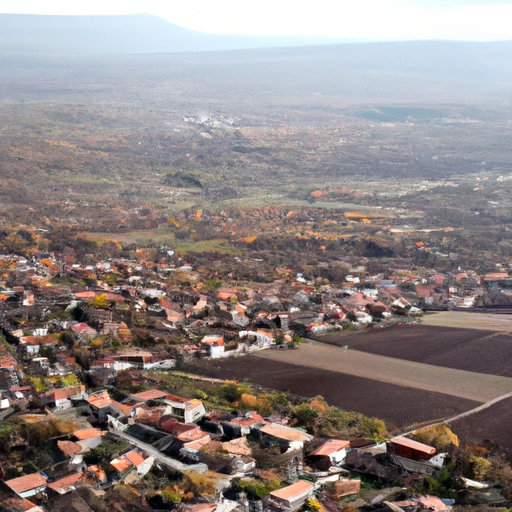
The Role of UNWTO in Revitalizing Rural Communities
Revitalizing Rural Communities: UNWTO’s Best Tourism Villages Combat Depopulation
In recent years, rural communities around the world have been facing a significant challenge: depopulation. Young people are leaving their hometowns in search of better opportunities in urban areas, leaving behind aging populations and dwindling economies. However, the United Nations World Tourism Organization (UNWTO) has recognized the potential of tourism in revitalizing these communities and has taken action to combat depopulation through its Best Tourism Villages initiative.
The UNWTO, as the leading international organization in the field of tourism, understands the power of tourism to drive economic growth and create employment opportunities. With this in mind, the organization has launched the Best Tourism Villages initiative to promote sustainable tourism in rural areas and encourage the preservation of local culture and heritage.
One of the key roles of the UNWTO in revitalizing rural communities is to provide guidance and support to local governments and communities. Through capacity-building workshops and training programs, the organization equips local stakeholders with the necessary skills and knowledge to develop and manage tourism initiatives effectively. By empowering these communities, the UNWTO ensures that they have the tools to leverage their unique assets and attract visitors.
Moreover, the UNWTO plays a crucial role in promoting the Best Tourism Villages and raising awareness about the potential of rural tourism. Through its global network and partnerships with other organizations, the UNWTO showcases success stories and best practices, inspiring other communities to follow suit. By highlighting the economic and social benefits of tourism, the organization encourages governments and communities to invest in sustainable tourism development as a means to revitalize their rural areas.
The Best Tourism Villages initiative also emphasizes the importance of preserving local culture and heritage. Rural communities often possess rich traditions, craftsmanship, and culinary delights that can be major attractions for tourists. The UNWTO works closely with communities to identify and promote these unique cultural assets, ensuring that tourism development is rooted in authenticity and respect for local traditions. By doing so, the organization helps communities preserve their cultural identity while also generating income and employment opportunities.
Furthermore, the UNWTO recognizes the need for sustainable tourism practices in rural areas. The organization encourages communities to adopt environmentally friendly initiatives, such as promoting eco-tourism, implementing waste management systems, and preserving natural landscapes. By integrating sustainability into tourism development, the UNWTO ensures that rural communities can benefit from tourism without compromising the natural resources that make their areas attractive to visitors.
In conclusion, the UNWTO’s Best Tourism Villages initiative plays a vital role in revitalizing rural communities and combating depopulation. Through its guidance and support, the organization empowers local stakeholders to develop and manage tourism initiatives effectively. By promoting the economic and social benefits of tourism, the UNWTO raises awareness and inspires other communities to invest in sustainable tourism development. Additionally, the organization emphasizes the importance of preserving local culture and heritage, while also promoting environmentally friendly practices. With the UNWTO’s assistance, rural communities can harness the power of tourism to create thriving economies, attract visitors, and ensure a brighter future for their residents.
Best Practices for Tourism Villages in Combating Depopulation

Revitalizing Rural Communities: UNWTO’s Best Tourism Villages Combat Depopulation
In recent years, rural communities around the world have been facing a significant challenge: depopulation. Young people are leaving their hometowns in search of better opportunities in urban areas, leaving behind aging populations and dwindling economies. However, there is hope on the horizon. The United Nations World Tourism Organization (UNWTO) has recognized the potential of tourism in revitalizing these rural communities and has identified best practices for tourism villages in combating depopulation.
One of the key strategies highlighted by the UNWTO is the development of unique and authentic tourism experiences. Rural communities have a wealth of cultural heritage, traditions, and natural beauty that can be showcased to attract visitors. By preserving and promoting their unique identity, these villages can create a niche for themselves in the tourism market. This not only brings in revenue but also instills a sense of pride and belonging among the local population.
To successfully implement this strategy, it is crucial for tourism villages to engage with the local community. The UNWTO emphasizes the importance of community participation in decision-making processes and the development of tourism initiatives. By involving the local population, their knowledge and expertise can be tapped into, ensuring that the tourism experiences offered are authentic and sustainable. This also helps to create a sense of ownership and responsibility among the residents, encouraging them to actively contribute to the success of their village.
Another effective approach highlighted by the UNWTO is the diversification of tourism products and services. While natural beauty and cultural heritage are important attractions, it is essential to offer a range of experiences to cater to different interests and preferences. This could include adventure tourism, agri-tourism, or even wellness retreats. By diversifying their offerings, tourism villages can attract a wider range of visitors and extend their tourism season beyond the traditional peak periods.
In addition to diversification, the UNWTO emphasizes the need for collaboration and networking among tourism villages. By forming partnerships with neighboring communities, villages can create tourism circuits that encourage visitors to explore multiple destinations in the region. This not only benefits the individual villages but also promotes regional development and cooperation. By working together, these communities can pool their resources, share best practices, and collectively market their region as a unique and attractive destination.
Furthermore, the UNWTO recognizes the importance of infrastructure development in supporting tourism villages. Accessible transportation, quality accommodation, and modern amenities are essential for attracting and accommodating visitors. However, it is crucial to strike a balance between development and preservation. Sustainable tourism practices should be adopted to minimize the impact on the environment and preserve the authenticity of the rural landscape.
In conclusion, the UNWTO’s best practices for tourism villages in combating depopulation provide a roadmap for rural communities to revitalize their economies and reverse the trend of population decline. By developing unique and authentic tourism experiences, engaging with the local community, diversifying their offerings, collaborating with neighboring villages, and investing in sustainable infrastructure, these villages can attract visitors, generate revenue, and create a brighter future for their residents. With the right approach and support, rural communities can thrive once again and become beacons of sustainable tourism.
Strategies for Revitalizing Rural Communities through Sustainable Tourism
Revitalizing Rural Communities: UNWTO’s Best Tourism Villages Combat Depopulation
In recent years, rural communities around the world have been facing a significant challenge: depopulation. Young people are leaving their hometowns in search of better opportunities in urban areas, leaving behind aging populations and dwindling economies. However, there is hope on the horizon. The United Nations World Tourism Organization (UNWTO) has recognized the potential of sustainable tourism in revitalizing these rural communities, and their Best Tourism Villages initiative is leading the way.
Sustainable tourism is a concept that focuses on preserving the environment, supporting local communities, and promoting cultural heritage. It is a way to attract visitors to rural areas while ensuring that the natural and cultural resources are protected for future generations. The UNWTO’s Best Tourism Villages initiative aims to identify and promote rural communities that have successfully implemented sustainable tourism strategies.
One of the key strategies for revitalizing rural communities through sustainable tourism is the preservation and promotion of local culture and heritage. Rural areas often have a rich cultural heritage that can be a major draw for tourists. By showcasing traditional crafts, music, dance, and cuisine, these communities can attract visitors who are interested in experiencing authentic cultural experiences. This not only provides economic opportunities for local artisans and entrepreneurs but also helps to preserve and celebrate the unique identity of these communities.
Another important aspect of sustainable tourism is the development of infrastructure and services that cater to the needs of tourists. Rural communities need to invest in improving their transportation networks, accommodations, and amenities to ensure a comfortable and enjoyable experience for visitors. This can be a challenge, especially for communities with limited resources. However, with the support of government agencies, NGOs, and private sector partners, rural communities can overcome these obstacles and create a tourism infrastructure that benefits both visitors and locals.
Furthermore, sustainable tourism can also contribute to the conservation of natural resources and the protection of the environment. Rural areas often boast stunning landscapes, biodiversity hotspots, and unique ecosystems. By promoting responsible tourism practices, such as limiting the number of visitors, implementing waste management systems, and supporting eco-friendly activities, these communities can ensure that their natural resources are preserved for future generations. This not only benefits the environment but also creates opportunities for eco-tourism, which is a growing segment of the tourism industry.
The UNWTO’s Best Tourism Villages initiative plays a crucial role in promoting and supporting these strategies. By recognizing and showcasing successful examples of sustainable tourism in rural communities, the initiative inspires other communities to follow suit. It also provides a platform for knowledge sharing and collaboration, allowing communities to learn from each other’s experiences and best practices.
In conclusion, sustainable tourism has the potential to revitalize rural communities and combat depopulation. By preserving and promoting local culture and heritage, developing tourism infrastructure, and protecting the environment, rural communities can attract visitors and create economic opportunities for their residents. The UNWTO’s Best Tourism Villages initiative is a valuable resource for communities looking to embark on this journey. With the right strategies and support, rural communities can thrive and become vibrant tourism destinations, ensuring a brighter future for both locals and visitors alike.


